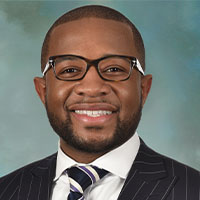
The Power & Responsibility of a Leader: The Theory of Leadership
- Published
- Oct 6, 2020
- Topics
- Share
Nkrumah Pierre, Director for EisnerAmper’s Friends of the Firm Program and leadership coach and strategist Raabia Shafi, discuss how leaders set the tone for the culture of an organization and how you can take ownership of the way you impact your team and customers. Raabia will share how humans have a primal instinct to follow leaders, which makes it even more important for us to cultivate self-awareness and empathy. She'll also share her perspective on the difference between being good at your job and being a good leader, and how you don't have to be born with certain traits to be successful.


Transcript
Nkrumah Pierre: Hello, and welcome to the Friends of the Firm Podcast part of the EisnerAmper Podcast Series. My name is Nkrumah Pierre, and I am the Director of EisnerAmper’s Friends of the Firm program. In the next two podcasts we will be discussing the power and responsibility of a leader with Raabia Shafi, Leadership Coach and Strategy Consultant. Raabia is also my executive coach, so I am proud and honored to have her with us today. Raabia, welcome and thanks for being here. Raabia, to get us going, could you share a little bit about your background with us? Why such a focus on leadership?
Raabia Shafi: Yes. Thank you so much, and I really appreciate being here, so I'm excited to jump into this conversation. In terms of the leadership piece, I focused on history for my bachelor's and my master's, really with a focus on leadership and US foreign policy. And after that, dove into the world of strategy consulting for the last several years. And I was a learning program specialist and facilitator for Booz Allen Hamilton, which is a large consulting firm based out of the DC area. And I focused on supporting the senior military and intelligence officials at the Pentagon, and in particular with the United States Marine Corps. And I also came to New York from DC about six years ago. I was directing the consulting arm of New York City hospitality icon and Shake Shack founder, Danny Meyer, organization to really help leaders across over 20 industries learn how to take care of their team, so that they could take better care of their employees.
RS: And really, that focus on leadership comes because over the last three and a half years, on behalf of working with my own consulting company, I've been a trusted advisor to senior leaders across over 20 industries to really help them create better workplace cultures for their teams. And I focus on fusing together my experience with design thinking, adult learning methods, and strategic thinking to really specialize in three areas, including organizational culture change, coaching, and leadership development. And I have to say, I'm really deeply passionate about leadership because what I've seen over the last years is time and time again, across so many industries that range from banking, to healthcare, to finance, to cruise lines and airlines, is that leaders have a tremendous amount of influence and power when it comes to productivity, engagement, and frankly, the overall success of an organization.
NP: Raabia, that's amazing. Thank you for that overview. Our CEO, Charlie Weinstein, is a huge advocate of his. Charlie actually, at one of the partner advances, required our partners to read the book Setting the Table by Danny Meyer. And it's interesting because the approach that he has, or has had on hospitality bodes well in the business community. So I'm just curious. How was that experience directing his consulting arm?
RS: Absolutely. Yeah. It's such a small world, and I think Danny has quite a reach, not just in the restaurant industry, as we've seen. It was quite phenomenal. He's a really inspirational visionary. And Setting the Table actually was the foundation from a content standpoint for the training workshops we did and the consulting and the coaching. So we were able to bring a lot of those thoughts and concepts to life, and realized it's a human need, not so much only in the restaurant, where people want supportive leaders to help them grow and evolve and get repeat business, ultimately.
NP:Excellent. Raabia, I know that you spend time interviewing employees as well. How has that informed your approach?
RS: One of the favorite parts of the work that I do is interviewing employees really about what they appreciate in terms of their culture and what frustrates them. And I also ask them to share what they would change if they had a magic wand. In fact, I was working with a client once with a CEO who was skeptical about bringing me in to do some of the organizational change work. And he said, or he asked me, "Why would you have you come in here and interview my employees, and ask them what they want to change? And all they're going to say is they want a raise, and I don't have the budget to do that, so everything's going to end up being my fault." And I actually was, somehow we were able to go through with the engagement. And I interviewed 280 of his employees across the New York City area. And Nkrumah, can you guess what the number thing they asked for was when I asked them, what was one thing they would like to change, if they no holds barred, and they had a magic wand?
NP:Hm. It's not money?
Raabia Shafi: It's not money. That was a hint for you.
NP: Communication?
RS: Close. It actually was, and I quote, "I really wish that the senior leadership team would say hi to us when they walk down the hallways because they act like we're invisible." And the really interesting thing was I also did a great deal of research on their customer experience. And the biggest feedback that they had from their customers was, "No one ever says hi to us on the staff." So when you talk about a ripple effect and what really it takes to have a great work environment, it's not always about the ping pong tables, or pizza Fridays. Oftentimes, I've seen it's about recognition, role clarity, accountability, clear expectations, and really having a level playing field for growth.
And in this type of work in terms of these interviews and all the data I've gathered through this research, all roads really do lead to the top, meaning the senior leaders in an organization are the ones who are going to have to start making changes to see any sort of positive impact in their organizations.
NP: So Raabia, that's such an amazing point when you think about the simple things, and that goes back to hospitality. Right? Making people feel good, remembering the person's name, pronouncing the name properly. When I go to hotels where I have status, they'll say, "Welcome back, Mr. Pierre. We see you've been at our hotel five times in the last three months. I imagine you're here for business." They know kind of my story, which is really comforting. It makes me actually feel good. To that point, a quick story, when I used to be in executive recruiting, executive search, working in that industry, one of the tests that we had for candidates was I had a relationship, friendship with the person at the front desk. And I would ask after I interviewed the candidate coming into my office, "How did they treat you?" And that was always a very good litmus test on a candidate. Right?
Did they say, "Good morning"? Did they say, "Good afternoon"? Were they friendly? Were they upbeat? When they approached you, were they condescending? Because so many times, we forget, no matter what, you're always being interviewed. It doesn't matter if you're going into the actual interview, whether it be with EisnerAmper, or another firm, or you're going into the search firm, which is going to represent you. So that was always a test we used. And again, depending on the candidate and my relationship with the candidate and if I might've had a position for that candidate, I'd of course coach them on that. And that was test number one.
And also of course, test number two would be the final test, going into the client that we were representing. And I would let them know, listen, be upbeat to everyone you interact with. When you walk into the building, say hello to the security guard, to when you see the person at the front desk, be respectful because people always forget to do that. And a lot of times, that can bite them. It's so important how you make people feel. At the end of the day, people might not remember what you said, but they will definitely, absolutely, unequivocally remember how you made them feel.
Raabia Shafi: That's totally accurate. And you know, Nkrumah, just before we move on, that there's that famous quote by Maya Angelou that maybe some of your listeners are familiar with. And it's people will forget what you said, people will forget what you did, but people will never forget the way you made them feel. And really, it fundamentally starts at the top, and it does have that ripple effect to your customer experience.
NP:So true. I love it. Awesome. So next question. Leadership is a broad topic. And our audience ranges with people in executive positions, management roles, and individual contributors. What are some key fundamentals that you believe about leadership that you think are important to highlight during our conversation today?
RS: Yeah. And actually, if you can, as the listeners, also just visualize a bullseye, or even a concentric circle, and imagine you as the leader are right in the center of that, in the center of the bullseye. Your teams then are in the next ring, and then the next ring are your customers, your clients, your patrons, your patients, whoever you actually exist to service. They're part of the outer ring. And whatever is going on with you and your fellow leaders, it's going to have tremendous impact on every layer of the organization, and then ultimately will impact your customer experience. And in other words, and this is a big premise for the consulting work that I do, it's happy employees lead to happy customers.
And the inverse is also true when it comes to unhappy employees leading to unhappy experiences for customers. And one time, I actually was buying a sweater at a store. And I realized that when I came home, there was a hole in it. So I bundled up, it was in the winter, and put all the layers back on, and I headed to the store to return it or exchange it. And the woman behind the counter greeted me with, "Hey, how's it going?" I said, "I'm doing fine. How are you?" And she said, "Do you want this back on your card? Or do you want cash for this?" And right as I was going to answer, she turned to her colleagues behind the counter with her, and she was saying, "I told you not to put me on the schedule on Friday. Why'd you do that? You never listen to me. This always happens."
And then she turned back to me and she said, "Did you say cash or credit?" And for me as a customer, I think all of us have kind of experienced that at some point. And the fascinating thing was everything that had to do with her own relationship with her boss, and perhaps the scheduling, or communication issues, or conflict management, all that had nothing to do with me as a customer. But it had everything to do with my own experience. And that's where there's such a deep connection between whatever is happening internally does have an impact externally. And we experience that every day as customers across industries.
NP:Raabia, thank you for that story. I think each of us can relate, or at least have had an experience where the salesperson, who's just not listening to you. If a salesperson is truly listening, and even in my business today with business development at EisnerAmper, at the end of the day, I tell people my job is to create solutions, find solutions for the customer, for the client. Right? I'm not there to sell audit. I'm not there to sell tax. If the client has a need and we can be a nice fit, awesome. But whatever you start selling, that's when a customer or prospective customer is turned off.
Now if you create or provide a solution, someone will pay a premium for a solution long before you can sell them a product or a service. And my mentors have always instilled that in me. Don't be a salesperson. Be a connector. Be someone that adds value. And to your point, Raabia, people are always listening and people are always judging. I mean, that's just what we do as humans. Right? We're always analyzing the situation. And to your point, the salesperson or the person at the cash register, they did not have to, I call it unload or unleash, their issues on you at that specific time. Right? That is almost something you say behind the curtain, something that is said behind closed doors, but not in the open. So really, really good points, and I think a lot of the listeners today can relate.
You've worked across a lot of different industries. You have an awesome background. Do you find this leadership ripple effect more common in certain industries?
RS: This phenomenon is actually true for any industry and any organization, any team. And what I've found through research is it's not just human nature. It's actually a primal instinct to follow our leaders. And I know that's a big statement to make. And the research actually shows that when a pack of gorillas, for example, walks through the jungle, the other members of the team physically lift their head to check what the leader is doing, to know that it's safe to proceed, or to know that there's tension coming up in the near future. They do this every five to 20 seconds, or at least two to three times a minute. And this is true when there's a threat, and even during periods of calm.
I remember in working with Danny Meyer, he used to tell leaders to imagine that people were looking at them with a magnifying glass, and as though they had a megaphone attached to their mouth. And all eyes are on you as a leader, whether we like it or not. And really, that means in the words of Spiderman's Uncle Ben, with great power comes great responsibility. And your team is already paying attention to your words and your behaviors instinctively as a leader. So you have a lot of influence when it comes to people following your lead. And the question then becomes: Well, why not channel that for good?
NP:Raabia, that is so true. So we recently hired a manager to join the Friends of the Firm program. Her name is Sue, and everything was done virtually, so no face to face interviews. I've never hired someone to join a team completely virtually, so of course, it was something new for all of us within HR, who did a phenomenal job. Shout out to Isabella and Jen, who found Sue, who's an awesome candidate. And also, I had to challenge myself to work through this new normal, if you will. And I'll never forget the night before, I had a call with Raabia. And I said, "I've never truly managed anyone full-time before."
And I'll never forget what you said to me. You said, "Nkrumah, listen. This first week, this first day of course, but this first week is so important that you get it right. And when I say get it right, meaning the way you show up." The way you show up is so important because when someone is on boarded to a new company, especially virtually, where everything is amplified, if you don't get it right the first week, the first day, the first hour, and we mean within reason, it can be catastrophic when it comes to the relationship you have with your colleague, with your team member. So thank you for that coaching.
RS: Yeah. You're more than welcome. And I'm so glad that you're putting this to use. And the other thing I would share is that it's not a one and done thing. It's not just about the first day or the first week, but how a leader works with a new hire and integrates that individual into the larger team because it can sometimes be a moving target. And it's something that we continually have to work on throughout because it's easy to slip back into bad habits and kind of the old ways of doing things, so I'm glad to hear it's going well. And I look forward to hearing about the continued progress.
NP:Yes, exactly. And that's an awesome point, Raabia. Like you said, it's not a one and done. Right? If you show up big, you have to also maintain that relationship, that level accountability from a leadership standpoint. We emulate our leaders. Right? So if someone shows up late to meetings and that's okay, then if someone else is on your team and they show up late, can you really be mad at them? We're always setting an example. And the coaching that you've given me over the last year has been awesome and invaluable, quite frankly, and I thank you for that. So Raabia, there are different schools of thought when it comes to leadership being a natural instinct, where some people think you're either born with a knack for leading people or not. What if our listeners don't necessarily have that instinct? How can our listeners use this power for good?
RS: I have to say that I might be a little controversial here. But after collaborating with and studying thousands of leaders and how they operate over the years, I am genuinely convinced that leadership is a separate skillset that can be learned. I don't think any of you are a lost cause if you did not enter this world with some leadership genius instincts. And oftentimes, I've seen leaders are thrown into people management positions, where they're just expected to somehow know how to give feedback, how to deal with conflict, how to delegate, or how to support an employee's growth. Just because you're good at your technical job does not necessarily mean you are going to know the five steps of giving feedback, or the three steps to delegating, or the essentials of body language when speaking in front of large crowds.
Those are all things that I facilitate in my workshops. And some of these very experienced professionals are hearing these fundamentals for the first time. And I think it's really important to honor that. One of the clients I actually had been coaching had recently bought a dental practice after completing residency and dental school, and had five hygienists and this big book of business for the area. And he was telling me, "Look, Raabia, I know how to fill cavities. I can do root canals. I can really make a great mouth guard for someone who has TMJ. But I never anticipated all the leadership struggles of managing a new team, and dealing with the conflicts that may have ensued among the colleagues, and making sure that there was an intentional positive culture in the workplace." And all of that really did impact the patient experience.
So I give a lot of credit to people who have those technical expertise in terms of that skillset. I think that organizations actually do take for granted that if you're good at your job, you're going to be a good leader. And I'm really doing the best I can to chip away at that misconception with the work that I do.
NP:Raabia, I love that. One of the things that I often see within a company's sales organization is the question really always becomes: Do you want to be an individual contributor, so you have your own clients, you eat what you kill kind of thing? And you go out and just do your job. Or do you want to be a sales leader, where you kind of take a step back from selling day to day, and you kind of have to manage a team of sales people, teach, coach, and mentor? And it's so interesting because there are sometimes people who are like, "You know what, I just want to sell. And I never want to manage, ever, ever, ever." Like, "No, thank you."
And then you have individuals who are like, "Well, selling is okay. I enjoy it, but I'm a much better coach, or player coach," as a term that I've used a lot. And I'm just curious. With your clients, have you seen that? Have you encountered an organization where the top producing sales person then goes to managing the sales team and things just don't go well?
RS: Yeah. I've absolutely seen that time and time again. And here's what I would say. Managing people, managing teams, and dealing with these individual issues that come about, and working on productivity, frankly, it's not everyone's cup of tea. And I think that more and more organizations are recognizing that there are technical tracks that you can take, where frankly, if you just want to keep on doing your thing and not manage teams, that's okay. And if you want to grow and evolve these people management skills and business development, and do those other things while using your technical expertise, that could be another track you can take. I think that organizations who respect that distinction, kind of the fork in the road, I think they're few and far between.
But I have heard of organizations doing that more because it's not everyone's thing. And I think it's okay and important to respect that. And actually, some of the exercises we're going to get into in just a little bit in terms of being on this leadership journey, it's important to investigate what one's intention is when it comes to being a leader. And if you really want to do it, I will tell you, leadership is not for the faint hearted. And oftentimes, it can go awry if that individual does not have the technical skillset of being a great leader.
NP:Raabia, thank you for this valuable information and thank you for listening to the Friends of the Firm Podcast, part of the EisnerAmper Podcast Series. For more information, and to join us for Part 2 of The Power and Responsibility of a Leader, where we talk about leveling up your leadership with practical self-awareness, visit EisnerAmper.com/FoF
Also Available On
What's on Your Mind?
Start a conversation with Nkrumah
Receive the latest business insights, analysis, and perspectives from EisnerAmper professionals.





